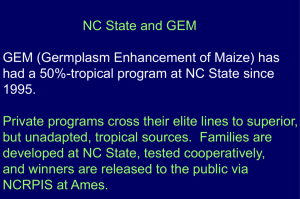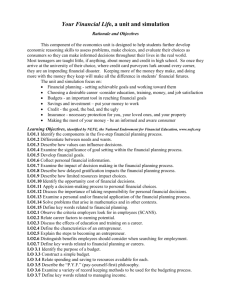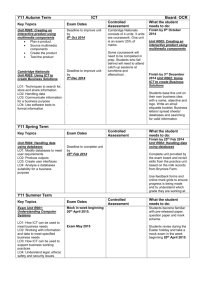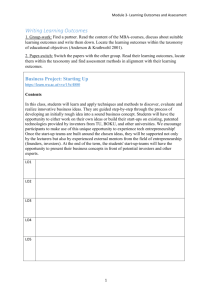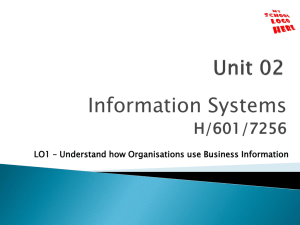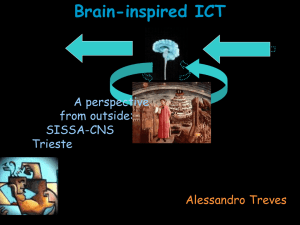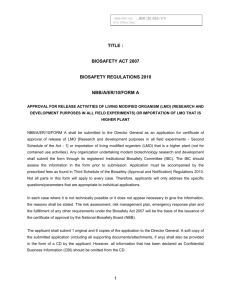N11
advertisement
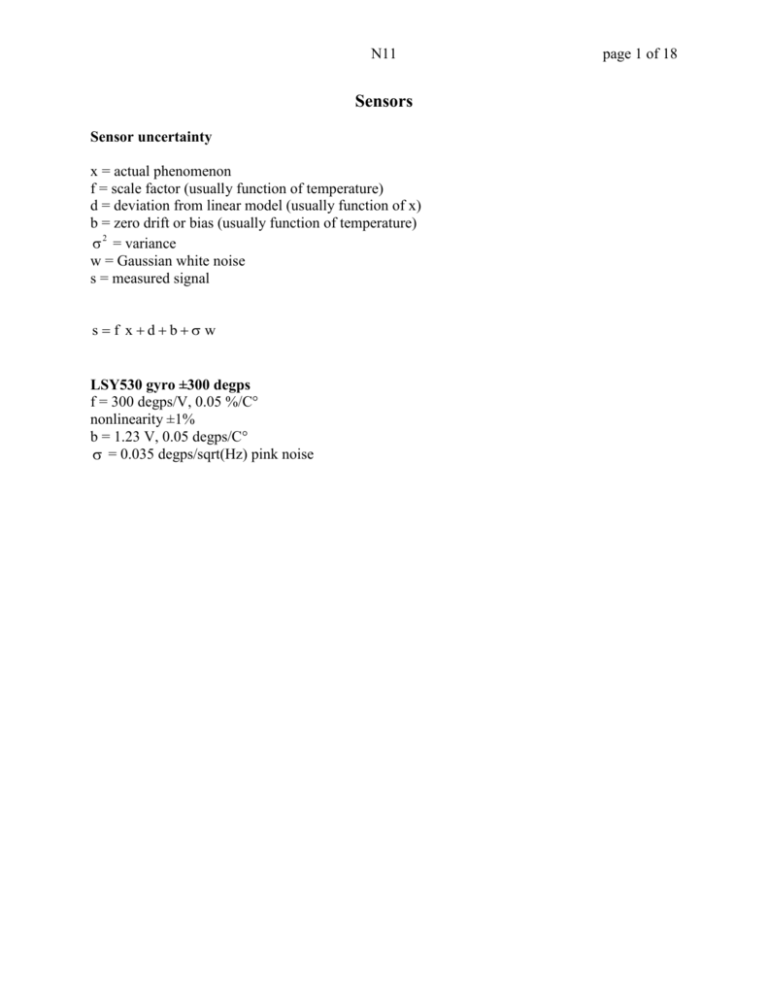
N11 Sensors Sensor uncertainty x = actual phenomenon f = scale factor (usually function of temperature) d = deviation from linear model (usually function of x) b = zero drift or bias (usually function of temperature) 2 = variance w = Gaussian white noise s = measured signal s f xdb w LSY530 gyro ±300 degps f = 300 degps/V, 0.05 %/C° nonlinearity ±1% b = 1.23 V, 0.05 degps/C° = 0.035 degps/sqrt(Hz) pink noise page 1 of 18 N11 page 2 of 18 Thermocouples T Seebeck effect – impose ΔT, measure ΔV NOT absolute temperature, only ΔT ΔV is mV - current capability is very small V Cu Fe Cu Con larger DIA wires reduce electrical resistance but cause more thermal droop Type E J K T N + chromel iron chromel copper nicrosil constantan constantan alumel constantan nisil µV/°C 68 50 41 43 39 ANSI + purple white yellow blue orange ANSI red red red red red range °C -50 to +740 -40 to +750 -200 to +1350 -200 to +350 -270 to +1300 M - nickel B, R, S – platinum/rhodium (up to +1800 °C for making steel) C, D, G - tungsten/rhenium P – palladium/gold/platinum thermoelectric coefficient subject to aging over long periods at high temperature N11 page 3 of 18 T V Cu Fe Cu Con ice bath T Cu V Fe Con Con Cu ice bath AD595 - ice point electronic offset and amplifier thermopile direct connection in pilot gas valves for water heaters and HVAC without amplifiers low current power source with thermal generators (radioisotope) N11 page 4 of 18 Con wire ceramic tube Fe wire steel disc brake steel plug Con wire ceramic tube rubbing face N11 page 5 of 18 Peltier-Thompson effect (reversible) – impose ΔV, create ΔT thermoelectric coolers different alloys - bismuth/telluride, lead/telluride, silicon-germanium, bismuth/antimony thermoelectric legs are thermally in parallel and electrically in series Peltier universal identification specification N11 USB beverage cooler page 6 of 18 N11 Thermistors resistance varies with temperature large non-linear R/T typically negative temperature coefficient (NTC) page 7 of 18 N11 specify Rt / R25 page 8 of 18 R25 = resistance at 25° C large R allows simple voltage divider VIN Rt 1 VOUT ~ linear VOUT / VIN no leakage R25 T N11 DS1620 DS18S20 page 9 of 18 N11 page 10 of 18 Strain gauge sensors R R nominal R = 120, 350 or 1000 units for = inch / inch units for R = / R nominal = 2 units for V = V / V VS N11 page 11 of 18 MUST use instrumentation amplifier to measure V quarter-bridge = one active gauge V VS VS 1 4 R R±R VB VA V R half-bridge = two active gauges VS adjacent arms subtract V VS 1 2 R R-R compression VB VA V R R+R tension full-bridge = four active gauges VS adjacent arms subtract - opposite arms add V VS tension R+R VA R-R compression VB V compression R-R R+R tension N11 page 12 of 18 bridge balancing pot VS 10R shunt calibration resistor V R = 1 K, RCAL = 1 M VS 1 K1 M 999 R PARALLEL 1 K 1 M effective 1000 in in RCAL V N11 page 13 of 18 strain gauge load cells, torque cells and pressure transducers can measure static readings nominally 3 mV/V at full load using 1045 cold rolled steel for substrate Y = 77 ksi E prevent yield for full bridge E = 30.0 x 106 psi Y Y / E 2567 in in Y Y / E 4038 in in V V mV 5133 5 VS V V using 2024 aluminum for substrate Y = 42 ksi E prevent yield for full bridge S-beam load cell E = 10.4 x 106 psi V V mV 8076 8 VS V V N11 page 14 of 18 Piezoelectric sensors electric CHARGE that accumulates in solid materials in response to applied mechanical strain ceramics, bone, polymers, DNA two modes - compression and shear requires CHARGE amplifier with extremely high input impedance prevent charge from bleeding away can measure transient readings very well can only measure static for short time periods ~100 seconds load cells, torque cells, pressure transducers, accelerometers, acoustic pick-ups much smaller and higher mechanical stiffness reversible to create actuators apply voltage - create strain can create moderate forces but very small displacements N11 page 15 of 18 N11 Hall effect sensors page 16 of 18 N11 page 17 of 18 N11 page 18 of 18

